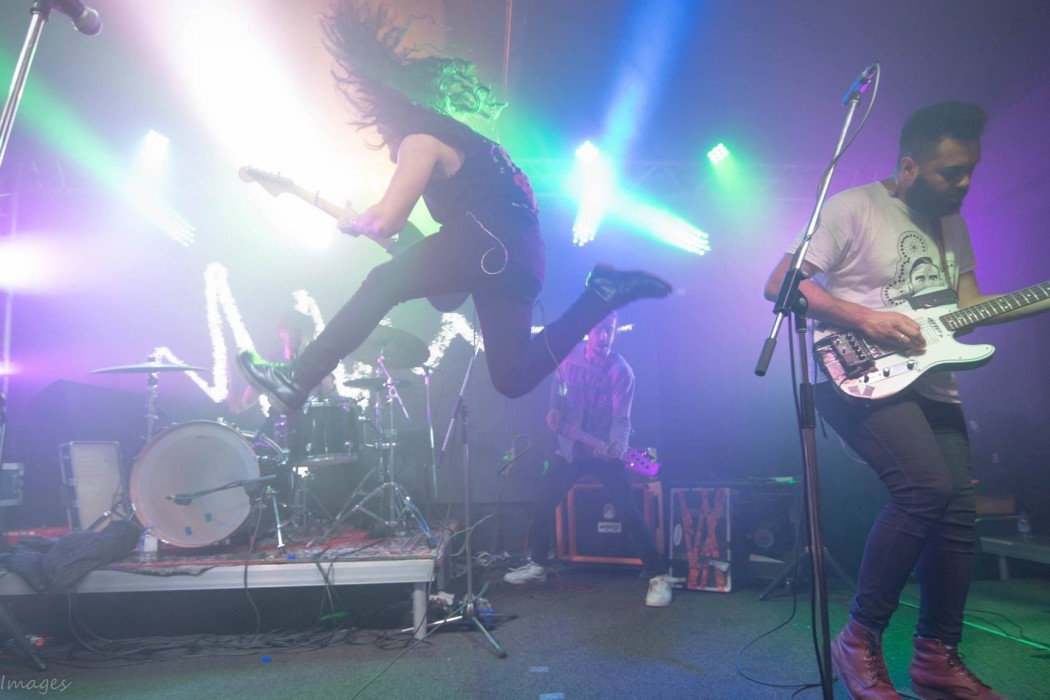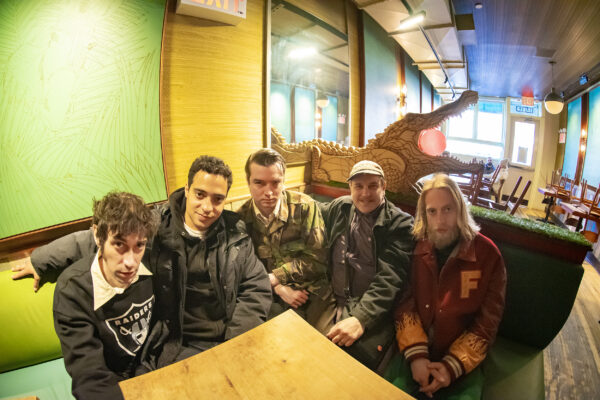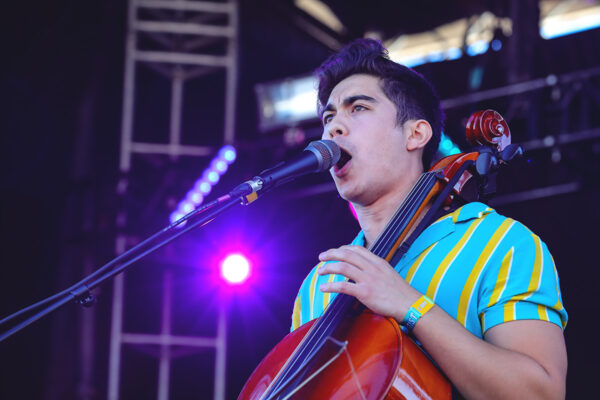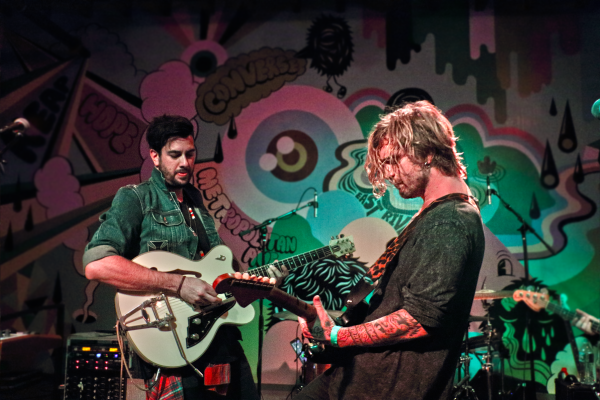Australian rock artists are slowly but surely beginning to emerge as some of the more talented breakout artists as 2015 draw to a close. Every year during events like SXSW and CMJ, the land from down under routinely sends over their emerging artists like the Courtney Barnetts and the Harts of the music world that leave their mark when they arrive, and manage to make something stick. Another band that’s beginning to make some noise of their own is the indie rock band Gang of Youths, whose debut album The Positions, has created quite the buzz for the band early on, being nominated for 5 ARIAs. Released independently on their own Mosy Recordings here in the U.S. recently, the band hopes to carry plenty of the buzz with them over here as they begin to take on the U.S. market.
The band’s frontman, David Le’aupepe was in New York over the weekend, which made for the perfect time to sit down and talk about breaking out of the Australian market, launching an album in the U.S., and more.
P&W: We’ll go over the new album in a minute, but first I’d love to hear how you guys feel you’ll really fit in, or stand out, and what really gives you guys an advantage with your music
David: I don’t think we have an advantage. You mentioned fitting in, I don’t think we fit in at all. I think the word ‘pop’ is something we’re pretty cool with actually. In terms of a contextual framework and musical ideas, we’re pretty cool with it, but I don’t think we necessarily satisfy all the criteria that would qualify someone as being ‘pop’, which I guess could also work as a disadvantage. I think I’m a little too serious about what I do, but we’re also pretty joke-like about who we are, if that makes sense. I think the United States is a completely different market than where we’re from in terms of what’s unique, and I think we’re trying to walk this positive tension of being artistically credible but also accessible, and I think a lot of people miss that. They want to be hugely successful, but don’t want to make anything good, or can’t. Then there are some people that want to make the best shit ever that no one gives a fuck about, so we’re trying to walk this line on hitting both sides. So I don’t think we have any advantage because might not know what to do with us.
P&W: Do you look at the success you’re starting to have in Australia and how it could carry over and be projected to your potential success here?
David: When you look at the trajectory, career-wise, that a lot of Australian bands are having from overseas, it’s usually to the outlandish heights of Tame Impala or Courtney Barnett. I think the Australian scene itself is quite condensed, so isolated, so far away, and dependent on less variables. There’s one really great radio station called Triple J, and if you get on there you tend to do pretty well for a few years, but it’s just not a big enough market to survive long term. I mean we’re just a bunch of rag-tag individuals who just want to make good music, we can find our own scene, we’re not looking to be so deeply entrenched in a culture, which is kind of cool right? There are no mods and rockers anymore, there aren’t hip-hop heads, everything’s just kind of bleeding into this indie culture, you notice that? It’s okay to listen to Young Thug and Taylor Swift now, and it’s cool. We’ll probably find a place to belong here, I guess it’s just part of the excitement of moving in I suppose.
P&W: Where does the name come from?
David: Gang of Four and Sonic Youth. When I was fifteen I was really into them, and I like how provocative it is when you type it into Google. There’s either stuff about us or about a gang of actual youths knocking over some trashcans. Unfortunately there’s a lot about gang rape, which I fucking hate but Gang of Youths kind of just happened. I liked the idea of appropriating a gang culture, I grew up in a gang infested neighborhood and have been familiar with them my whole life. So Gang of Youths is somewhat provocative but also easy to say and semi-memorable I suppose.
P&W: Your debut album was just released here in the U.S. and was released in Australia back in April, and has been met with high praise so far. Is that something you necessarily expected when you were planning to put one out?
David: I just wanted to write an album for the girl I was with, because she had cancer at the time. I never thought about the album from a big picture, it was always about the micro importance and what it meant to me personally. Then I realize there was the smallest chance I could make something beautiful out of a horrible, fucked up, shitty situation. So I thought let’s try to make some art of out misery. The acclaim thing is terrifying though, because critical acclaim comes with a glory and a pride, but also a weight that you can’t anticipate before it gets there. I desperately wanted to make something that was well received, that was our intention. We wanted to make beautiful art, but at the same time it puts so much weight on our next offering, like how do we keep that traction going? Are the critics looking at the narrative of the album or the music in itself? It also comes with the idea that we might have done something okay, but at the same time will we ever make something okay again?
P&W: The American culture has become so engulfed around the idea of fame, and celebrity. I feel like when most kids want to start a band or a solo career, their goal is to become famous, and their attention isn’t focused on their own style of art. You say that you just want to make beautiful art, which is refreshing to hear. Maybe that’s our different cultures, but how would you look at that?
David: Kids are all the same everywhere, especially in the west. I use the word homogenized because Australia is becoming very homogenized because of the influence of American and British culture. I don’t want to sound like I’m degrading my own generation…
P&W: Don’t worry I’ll do it for you.
David: (laughs) Yeah, I mean it’s become about becoming something rather than someone. I’m think I’m this way by default coming from a working class, and Christian background. I didn’t have much money or inflated self-worth. I’ve always hated the red carpet shit, I threw a tantrum about having to do my first red carpet event coming up. I was going to be a pro athlete, but I hurt myself as a teenager in a rugby game, and I guess I just gravitated towards making music instead. None of us in the band are that interested in becoming successful on that level, we just wanted to be able to feed our families, have fun, and see the world. I have the most fun job in the world, any musician that says different is fucking lying, it’s the best fucking job in the world.
P&W: You know, in listening to the new album, none of the tunes are under the four minute mark, most of them go into five to seven minutes in length. Was there any pressure from the label or even yourself on making sure the songs can find some airplay being a little longer?
David: We had to make a couple of edits, but then I think people realized I’m too stubborn to do that shit. The parameters by which the label addressed our record were a little different because we had full creative control. They can A&R it, but at the end of the day every decision was my own and the boys which is fucking awesome. We have the best label situation at the moment, we run our own label and Sony distributes it and they’re incredibly fucking cool. I think they realized that working with me means having to bend to my will a little bit. I’m difficult, but I’m in no way unreasonable. I understand that there’s an important exchange that takes place between the artist and the label but at the end of the day we wanted to make the album that we wanted to make. Regarding radio, I have trouble giving too much of a shit about what I hear on the radio, cause I don’t really listen to it.
P&W: Yeah I can’t remember the last time I listened to terrestrial radio
David: (Laughing) Yeah me neither. I mean I don’t really know what works on radio and when I listen to radio it’s either classic rock or some pop stuff here or there. Life’s too short to let some cunt tell you how to live your life. We sold a bunch of units in Australia so it’s not like we’re at the bottom of the barrel with the little boys anymore, we’ve moved up to the big leagues. They said the formula wouldn’t work. I’m not sure who ‘they’ are, but they exist. People liked the music and they liked how long it was and fuck you if you don’t think it’s good on radio.
P&W: Did the album end up sounding the way you thought it would when you had all the song ideas in your head?
David: It came out sounding how I thought it would sound because we recorded it over three years, during which I went through a marriage breakdown, a suicide attempt, drug problem, and everything during the middle of it so the record reflect a lot of that. There’s grime where there should be grime, there’s perfection where there should be perfection, and I like the way it sounds, but it’s good that we started it at seventy percent because I want to get to one-hundred percent by the next record. I guess it really started sounding like something that I liked when we were in the final mixing stage. Maybe I didn’t anticipate it sounding the way it did, but now that we have a lot more control over our sound in the studio, it’s going to sound the way we want it to next time. We’ve also got an EP coming out soon and that’ll be pretty close to it I think.
P&W: Have you toured the U.S. with this album yet?
David: No we’re gonna do it next year, because we’re moving over here permanently in April and possibly do SXSW to coincide with the release of this EP.
P&W: Who in the Australian music scene are you really into?
David: Oh I really like, oh man there’s this incredible band that you have to check out called The Ocean Party, they’re amazing. A friend of mine named Kirin J Callinan is just tremendous, he plays guitar with Mark Ronson. I really like Courtney Barnett, um a friend’s band called Slum Social, they’re quite spectacular, I don’t like a lot of Australian music, but they’re the cream of the crop for me. There are some really good artists, but a lot of them migrate overseas, not to many stay around Australia, which is understandable. Oh also Twerps and Dick Diver. They’re signed to Merge Recordings.
P&W: How do you see your style and sound growing as your career begins to take off?
David: Never electronic. Not for any particular reason aside from it’s just an oversaturated market and we wouldn’t be very good at it. Plus I like instruments. If I ever did a solo project then fuck yeah I’d do electronic. It’s just not in my bag right now; I’m a longhaired, tattooed rocker. The EP toes the line between where we want to go and where we came from. I want to eliminate the low fidelity aspect of The Positions, not because I don’t like the way they sound and the whole lo-fi thing, but I have to grow up at some point, I can’t just be a nineteen year old with ideals anymore.
P&W: You and me both man.
Article: Tom Shackleford




